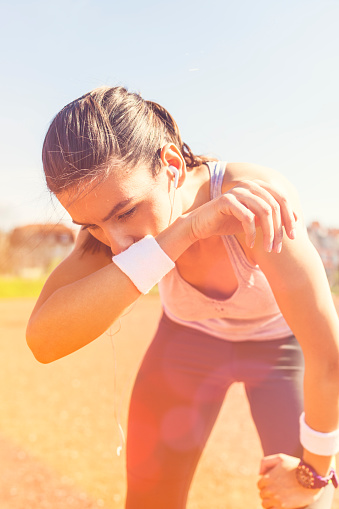
Why do we sweat?
What is sweat and when does it become a problem?
Sweating or perspiration is the secretion of sweat through the sweat glands in the skin. These glands are all over the body and are stimulated by environmental heat, physical activity or powerful emotions.
Sweating is a normal reaction of the body, which controls body temperature, removes waste products and contributes to the acid pH of the skin to form a barrier against germs and micro-organisms.
There are two types of sweat glands:
- Apocrine sweat glands are found mostly in the armpit, the hands, soles of the feet, scalp and face. These glands become active with adolescence and start working when we do physical activity or find ourselves in stressful.
The sweat produced by these glands contains less water and more concentrated pheromones, proteins and lipids. That is why it has an odour. - Eccrine sweat glands are found all over the body and control body temperature to keep the body at between 35-37C.
The sweat from the eccrine glands is 97% water and diluted salts, which is why it feels wet, but has hardly any odour.
When do you sweat more than normal?
- When you have drunk too much alcohol.
- When experiencing withdrawing from drugs or alcohol.
- Due to hypoglycaemia or a fall in blood sugar.
- Due to a sudden drop in blood pressure.
- When eating very spicy food (gustatory sweating).
- After taking narcotics or powerful analgesics.
Sweating is also caused by a number of health problems such as lack of sweat (hipohydrosis), excessive sweating (hyperhidrosis) or very strong-smelling sweat (bromhidrosis).
- Hypohydrosis or anhydrosis (little or no sweating) is a rare disorder that can be extremely serious, since it can affect the body’s capacity to regulate its own temperature and is difficult to control. It is accompanied by headaches, high temperature, vertigo and palpitations. People with this condition must avoid hot places, keep themselves well hydrated and control their temperature, under medical supervision.
- Hyperhidrosis or excessive sweating is more common and can be a social problem. Patients feel embarrassed about sweating so much and have to have frequent showers and change their clothes often. There are some treatments such as antiperspirants, aluminium chloride and even botulinum toxin injections to reduce the activity of the sweat glands.
- Bromhidrosis is the name given a condition that causes sweat to have a strong smell. This is caused by abnormal activity of the apocrine sweat glands that contain ceramides which, when they come into contact with the bacteria on the skin, produce ammonia and fatty acids that cause a strong odour. This also makes patients feel socially awkward because the smell is associated with lack of hygiene. It can be treated with neutral or glycerine soaps, depilating the under arm area, a change of diet, giving up coffee, garlic, onion and alcohol and using antiperspirant deodorants and topical antibiotics.
